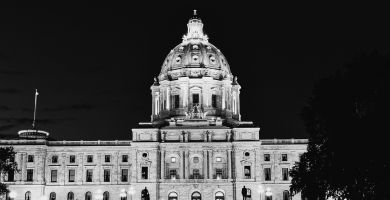The Minnesota Legislature adjourned sine die following the senate’s adjournment on May 19 and the house’s adjournment on May 20.
Legislators were in a hurry on the final evening to pass numerous bills before the midnight deadline, leading to many bills being left on the table or amended into other policy bills. This was the case with HF 5247, an omnibus tax measure, and its amendment in a conference committee late on May 19 to include policy provisions from eight different bills in finance, energy, health, and transportation, totaling over 1,400 pages. This measure awaits executive approval.
The Minnesota Legislature meets on a biennium, which means, in odd number years, bills carry over to the next year. At the end of the two-year session, if bills did not pass, they must be reintroduced in the next legislative session. In total, 11,023 bills were introduced with approximately 150 passed by both chambers.
Here is what you may have missed:
Ticket Transparency
Touted as the Taylor Swift Act, HF 1989, which provides stronger consumer protections for ticket buyers by banning speculative ticketing and reducing deceptive ticket practices, was signed by Governor Tim Walz (D). The measure was introduced in response to the Taylor Swift ticketing situation where fans were charged high fees. The bill takes effect on January 1, 2025. Similar ticket protection legislation has been passed in Maryland and is pending executive approval in Colorado.
Energy
Building upon HF 7 from last year, which gradually moves Minnesota to 100% clean energy by 2040, the Minnesota Energy Infrastructure Permitting Act, a part of the Agriculture, Commerce and Energy Supplemental Budget package (SF 4942), was signed on May 24 by Walz. The act streamlines the permitting process for energy projects by facilitating communication between state agencies on these projects. It also outlines permit requirements for construction of large energy projects, such as electric generating plants, solar energy generating systems, energy storage systems, or large wind energy conversion systems.
Net Operating Loss
The legislature passed HF 3769, which adjusts the timeline of the 2023 tax bill provision to reduce the corporate net operating loss deduction limit. The measure fixes a drafting error in the 2023 tax law that made numerous Minnesota companies pay more in taxes this year than originally intended. Since 2019, the corporate net operating loss deduction had been limited to 80 percent of a corporation’s taxable income until last year when the legislature charged this limit from 80 percent to 70 percent.
Child Content Creators
Walz signed HF 3488 to provide compensation for minors appearing in internet content creation. A similar measure has been introduced in California (SB 764) and is under consideration.
Budget
The legislature passed many policy provisions within several budget omnibus bills in areas such as waste, housing, and transportation.
Important policy provisions from the series of budget bills include:
- Establishing the Packaging Waste and Cost Reduction Act, which requires producers to finance a statewide program for packaging and paper products. The bill also encourages packaging redesign to reduce environmental impacts and human health impacts. With passage of this provision, the state became the fifth to adopt extended producer responsibility for packaging. (HF 3911)
- Allowing the Minnesota Housing Finance Agency to use housing infrastructure bonds to finance the costs of construction, acquisition, recapitalization, rehabilitation, conversion, and development of cooperatively owned housing that is affordable to low- and moderate-income households (HF 5247)
- Requiring the Commissioners of Public Safety and Transportation to conduct a joint study to address commercial driver shortages in the transportation and transit sectors. (HF 5247)
Interim and Future Outlook
Representative Liz Olson (D), who leads the House Ways and Means Committee, and Representative Michael Nelson (D), who has served in the legislature since 2002, will not run for re-election in November. Minnesota has an active interim, so, over the next several months, there will be committee meetings where draft legislation may be introduced for the next legislative session. For further insights into any legislation passed in this session or discussions occurring during the interim, please contact Stephanie Obieroma at seb@stateside.com.
